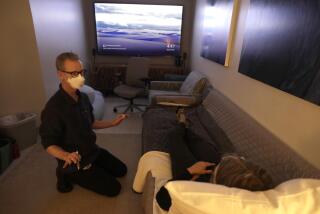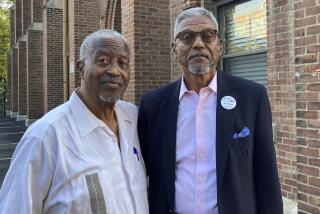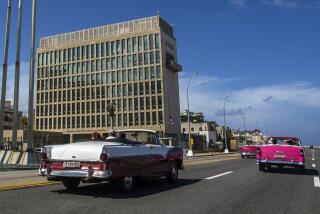Pentagon Slow to Probe Gulf Illnesses, Panel Finds
WASHINGTON â The Pentagon was slow in investigating whether chemical weapons could be causing Persian Gulf War veteransâ health problems, though any nerve gas exposures that might have occurred are unlikely to explain their illnesses, a presidential panel has concluded.
In its final report, the Presidential Advisory Committee on Gulf War Veteransâ Illnesses generally praises the governmentâs response to ailing veterans, concludes that their medical treatment has been âexcellentâ and states that current efforts to research their problems are âappropriate.â
But the report urges that all possible exposures to poison gas during the war be thoroughly investigated, noting that one of the âprincipal uncertaintiesâ about veteransâ illnesses concerns the possible long-term effects of exposure to chemical weapons.
President Clinton will receive the report today. He is expected to ask the 12-member committee to oversee efforts to implement more than a dozen recommendations in the report.
A senior White House official said most of the committeeâs staff will remain on the job at least through the fiscal year, which ends Sept. 30. The committee--composed of veterans, scientists, doctors, nurses and policy experts--will review actions by the departments of Defense and Veteransâ Affairs, the official said.
Clinton created the committee to investigate âGulf War syndrome,â a group of chronic symptoms, including fatigue, muscle and joint pain, memory loss and headaches, afflicting veterans. During 18 meetings around the country starting in August 1995, the panel heard from dozens of veterans, scientists and medical practitioners, as well as from people with unorthodox theories about what might be causing illness in the veterans.
Some veterans and politicians have criticized the Pentagon for not revealing until June that thousands of soldiers may have been exposed to nerve gas in March 1991 when American troops blew up an ammunition dump in Khamisiyah, Iraq, in a cleanup operation after the war.
More to Read
Sign up for Essential California
The most important California stories and recommendations in your inbox every morning.
You may occasionally receive promotional content from the Los Angeles Times.









